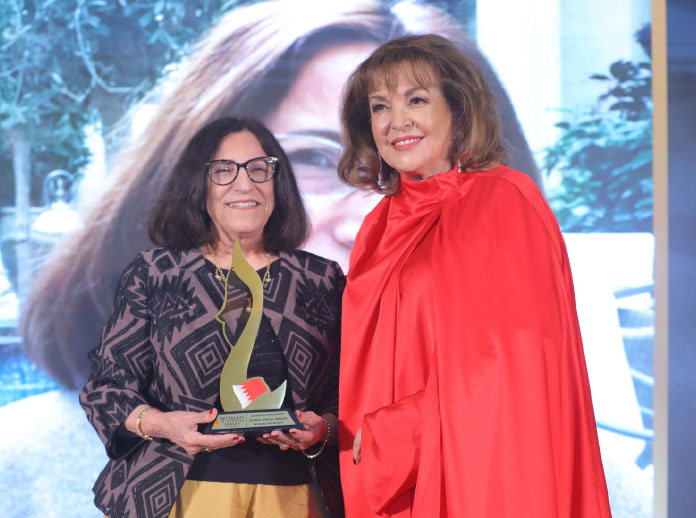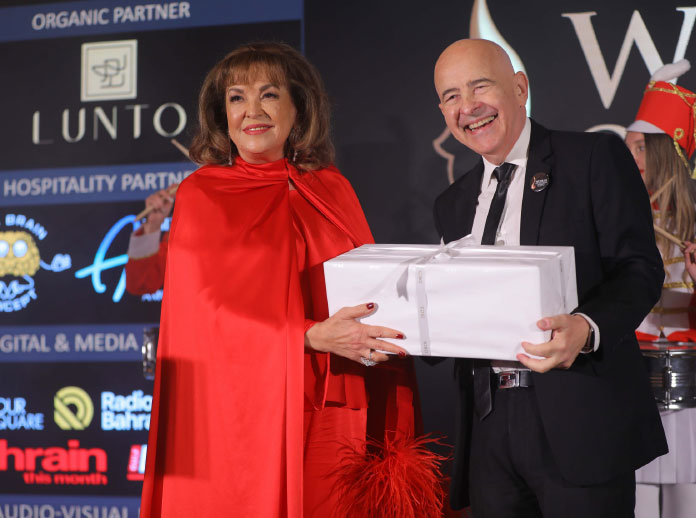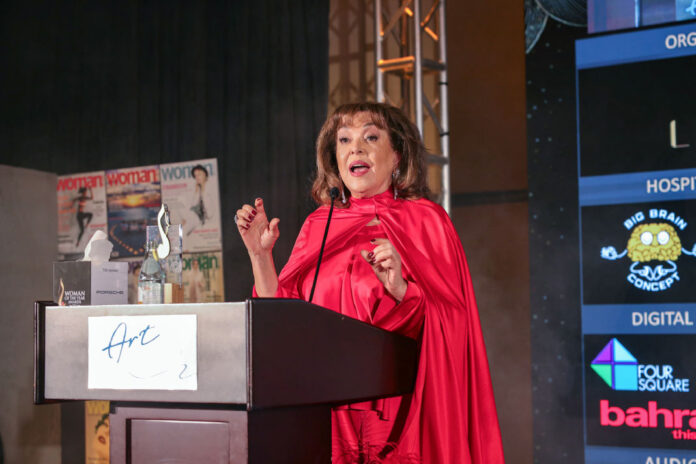Baria Alamuddin is trailblazing, award-winning journalist and broadcaster who has made an indelible mark on Middle Eastern and global media. Over her illustrious career, she has interviewed influential political and cultural leaders, championed women’s rights and advocated for social justice. Known for her sharp insights and fearless reporting, she has become a role model for women in journalism in a region where such achievements were once rare. Ahead of her appearance as Chief Guest at the Woman of the Year Awards 2024, Ms. Alamuddin sat down with Kristian Harrison to reflect on her journey, the challenges she overcame, and her hopes for the future of journalism and gender equality.
What inspired you to pursue a career in journalism?
My journey into journalism was deeply influenced by my upbringing and my mother’s values. She instilled in me ideals of freedom, justice and education from a young age. I initially considered a career in law, thinking it would be my path to contribute to justice, but the opportunities for women in Lebanon at that time were limited. Journalism offered an alternative way to advocate for truth and social change.
I decided to study mass communication and political science, which gave me a strong foundation in understanding the world around me. Early in my career, I focused on women’s issues, but as I gained experience, I discovered my passion for politics and interviews. My curiosity and love for storytelling made journalism feel less like a job and more like a calling.
As a Middle Eastern woman in journalism, what challenges did you face in the early part of your career?
When I began, journalism was a male-dominated field, as were many academic fields which were deemed unsuitable for women. There were societal expectations that I needed to navigate, even from within my own family, but I was determined to prove that women could excel in any field.
I also faced professional challenges and deadlines, such as working in high-pressure environments, taking late-night assignments and confronting tough political issues. However, as I gained experience, I began earning the respect of my colleagues, many of whom became my mentors.
Lebanon, despite its challenges, has always been a hub for journalism in the Arab world. I was fortunate to study at the American University of Beirut, where I learned from some of the best minds in the field.
You’ve interviewed some of the world’s most influential leaders. How have these interviews impacted you?
Interviewing global leaders and activists has been an incredibly enriching experience, both personally and professionally. Some leaders left me with a bad impression, but others severely impacted me. One of the most memorable interviews I conducted was with Indira Gandhi, the former Prime Minister of India, shortly before her assassination. Her humility and dedication to her country left a lasting impression on me and she taught me a valuable lesson about the importance of leadership and service. I’ve also interviewed other inspiring people in Bahrain and the Middle East including HM King Hamad bin Isa Al Khalifa, his father Shaikh Isa, King Hussein of Jordan, and the famous poet Ghazi Al Gosaibi.
 How do you view the progress of women’s rights in the Middle East compared to 30 years ago?
How do you view the progress of women’s rights in the Middle East compared to 30 years ago?
There has been undeniable progress, but it varies significantly by country. Gulf nations like Saudi Arabia and the UAE have made strides in areas like education, workforce participation and leadership. Women in these nations have become astronauts, entrepreneurs and political leaders transforming their societies in remarkable ways.
However, other regions, like Afghanistan and Iran, have seen setbacks, with regimes actively suppressing women’s voices. It’s heart-breaking to witness these regressions, especially when women continue to fight courageously for their rights.
My own mother, who was a passionate advocate for girls’ education, remains my inspiration. Her efforts to ensure girls had access to schooling, even in impoverished areas of Lebanon, taught me the importance of education in empowering women. Today, I see a new generation of Arab women breaking barriers, but the road ahead remains long.
How did your mother’s advocacy for female education shape your views on women’s empowerment?
My mother was a true pioneer. Although she passed away when I was young, her legacy has been a guiding force throughout my life. She worked tirelessly to promote girls’ education, even establishing schools in conflict-affected. Her belief that men and women are equal partners in society became central to my own advocacy.
Growing up, I watched her urge families to send their daughters to school, even when it was uncommon. Her determination inspired me to continue her work, advocating for women’s rights through my journalism and other efforts.
 How do you see the role of media in shaping societal change, particularly in the context of gender equality?
How do you see the role of media in shaping societal change, particularly in the context of gender equality?
Media plays a crucial role in challenging societal norms and amplifying the voices of the marginalised. While state-controlled media in parts of the Middle East can limit progress, independent platforms and digital media offer new opportunities for change.
Journalists have the power to expose injustices, tell true stories that inspire action, and advocate for equality. In the Arab world, we’ve seen women journalists cover conflict zones and societal issues with bravery and professionalism. However, the rise of misinformation is a growing challenge, threatening the integrity of journalism and hindering progress on critical issues like gender equality.
As a mother, how did you encourage your children to pursue their own paths?
I’ve always believed in letting my children follow their passions. I have four children –two daughters and two step-sons – and I encouraged each of them to leave a footprint that can bring change in the world and explore what truly made them happy. Amal and Tala, for instance, have pursued careers in law, academia, entrepreneurship and design, and I’m incredibly proud of all my children’s accomplishments.
My emphasis has always been on values like hard work, integrity and compassion. These principles have guided my children in becoming the strong, independent individuals they are today.
What role do you hope your work will play in inspiring future generations?
I see journalism as a powerful tool for social change. My goal has always been to use my platform to raise awareness about critical issues like women’s rights, diversity, education and justice.
I hope to continue sharing stories that inspire, mentoring aspiring journalists and writing books that reflect the lessons I’ve learned over the years. Ultimately, I want my work to encourage young people, especially women, to believe in themselves, fearlessly pursue their passions and contribute to building a more equitable world.





